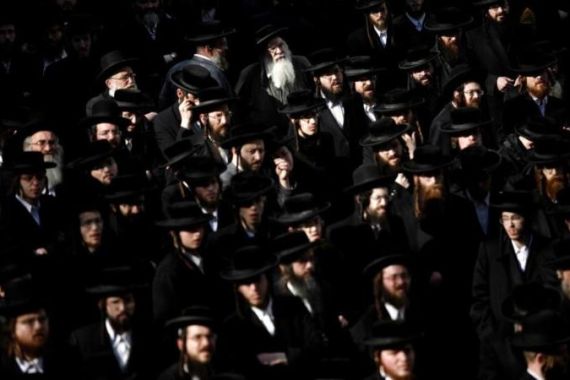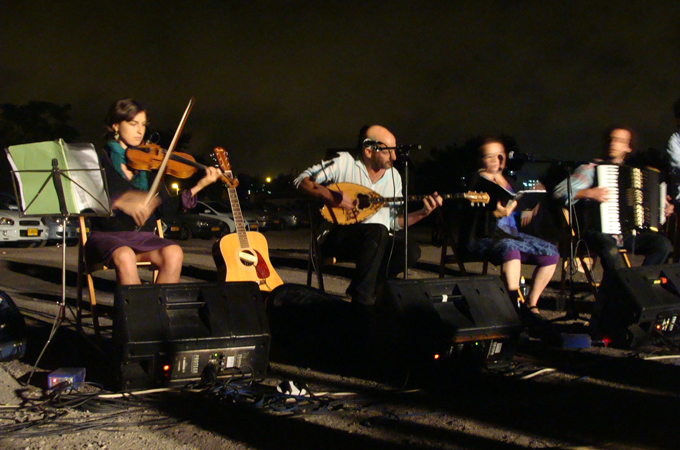Israelis fight over neighbourhood’s soul
Inroads in West Jerusalem’s Kiryat Yovel by ultra-Orthodox Jews seeking to impose their ways are alarming the secular.

Just like the Israeli-Palestinian conflict, the ongoing struggle for Kiryat Yovel began with a small strip of land.
Residents of this predominately secular neighbourhood of West Jerusalem call it “Warburg Lot”. Located in the heart of Kiryat Yovel, locals have taken to holding cultural events on Warburg on Friday nights, sometimes offending their ultra-Orthodox neighbours. Friday night also marks the beginning of the Jewish Sabbath, the holy day. The observant do not use electrical appliances, handle money, or play musical instruments during this time.
Perach Adom, a band whose name means Red Flower, plugged into amplifiers and played Greek rebetiko to an audience of several hundred secular Israelis on a recent Friday night. A table set up on the edge of the field offered beer and snacks in exchange for a donation. Volunteers asked concert-goers to sign a list to get emails from Free Kiryat Yovel, a grassroots movement that would like to preserve the “pluralism” that residents say define their neighbourhood.
Fight over space
The fight for Kiryat Yovel began on a hot August morning in 2008, when tractors arrived and began digging on the Warburg lot. Residents understood the lot to be public and they used the space to exercise, walk their dogs, and to park cars. Surprised to see the construction, locals rushed out and asked the workers what they were doing.
|
“They come, they dig, they put a caravan, and that’s it.” – Dina Azriel, ‘Free Kiryat Yovel’ activist |
When the workers hesitated to explain, residents stood in front of the tractors and called the municipality. Eventually, it became clear that the men had come to install two caravans and connect the structures to water and electricity. The buildings would serve as kindergartens to the ultra-Orthodox community, a group that insists upon having their own educational system, separate from both the Palestinians, as well as secular Israelis.
But there was no ultra-Orthodox community in Kiryat Yovel. And the workers did not have the appropriate papers from the municipality to carry out the construction. Rather, they had received verbal permission from then-Deputy Mayor Yehoshua Pollack, who is ultra-Orthodox and was later arrested in an unconnected real estate scandal. Among other charges, he was accused of taking bribes.
Dina Azriel is an activist with Free Kiryat Yovel. She says the attempt to build the kindergarten was reminiscent of the founding of some Israeli settlements. “They come, they dig, they put a caravan, and that’s it.”
Just as infrastructure helps pull Israelis across the Green Line, schools and synagogues serve as a magnet to attract new religious residents to traditionally secular neighbourhoods of Jerusalem. Additional infrastructure is then built to accommodate the new residents. Religious buyers sometimes come and make secular homeowners generous offers, and little by little the veteran residents are edged out. It has happened across Jerusalem – to the extent that some 20,000 secular Israelis have left the city in recent years.
 |
| Cultural events on Friday nights in Kiryat Yovel sometimes offend the ultra-Orthodox [Mya Guarnieri/Al Jazeera] |
While secular Israelis represented about 40 per cent of Jerusalem’s population a decade ago, today the city of 800,000 is split almost evenly into thirds between the secular community, Muslim Palestinians, and the ultra-Orthodox.
Though their birthrates have dropped in recent years, the ultra-Orthodox still have more babies than Palestinians, Arab Israelis, and secular Jewish Israelis. It is estimated that 20 per cent of the country will be ultra-Orthodox by 2034 – meaning they are expected to change not just the landscape of Jerusalem, but the face of Israel.
But the secular residents of Kiryat Yovel are determined to stay. The day after construction workers attempted to build the ultra-Orthodox kindergarten, Azriel and other locals started a committee to protect the neighbourhood.
“We blocked the entrance to the lot with cars so tractors couldn’t enter,” Azriel recalls. The community also filed a lawsuit that effectively prevented the ultra-Orthodox from using the land for their own purposes.
Inroads in Kiryat Yovel
Still, the ultra-Orthodox community – or Haredim as they are known in Hebrew – have made inroads in Kiryat Yovel. They have a visible presence in the neighbourhood and managed to open a kindergarten next to a secular kindergarten. To the alarm of many secular and some ultra-Orthodox residents, the city erected a separation fence between the two schools. And, because the ultra-Orthodox complained that their children would see secular Israelis with immodest dress and little boys without kippot – the skullcap worn by observant Jews – through the fence, the barrier was covered with a blue tarp.
Azriel and her husband, Danny Unger, emphasise that they and other members of Free Kiryat Yovel do not take issue with the ultra-Orthodox themselves. Rather, they are concerned by the anti-pluralist and anti-democratic trends that, they say, come with the community.
“The problem is not that they’re coming,” Unger remarks. “We’ll gladly accept them. The problem begins when you come and want to make a separation [between yourself and the existing community].”
Azriel and Unger are also concerned about the allocation of the city’s resources. They say that public space should be used for the good of the whole neighbourhood, not for a specific population that is new to the area and that will keep others out.
“Public space has to stay equal and open to everyone,” Azriel says.
City councilwoman Laura Wharton shares this sentiment. “This is my position also about East Jerusalem,” she says, where Palestinians receive services that are disproportionately less than those received by their Jewish counterparts, despite the fact that Palestinian residents pay taxes. “The resources of a given area [should be] devoted to the people who live there.”
Wharton lives in Beit HaKarem, a predominately secular neighbourhood where a park was bulldozed to make way for a mikveh – a bath for ritual immersion – despite the fact that the area is home to only a handful of ultra-Orthodox residents.
Voting bloc
|
“The current government is interested in attracting settlers, and they offer land for free and really good mortgages and really good social systems.“ – Laura Wharton, city councilwoman |
While they remain a minority in both Jerusalem and Israel, the ultra-Orthodox wield a disproportionate amount of political power because they tend to vote in a bloc. And perks like subsidised housing and financial assistance for large families come with that power.
The ultra-Orthodox are, for the most part, poor and don’t pay a lot of taxes. Because Jerusalem is struggling to stay afloat financially, the municipality has given developers the green light to build luxury apartment buildings and commercial spaces in the place of apartment buildings that are home to low- and middle-income Israelis. The occupants of these new buildings will pay more taxes, carrying those in the city who don’t pay enough.
As Israel moves away from the welfare state that characterised the country’s early days and becomes increasingly capitalist, in part to keep the ultra-Orthodox afloat, more Israelis are attracted to the ultra-Orthodox’s ranks.
“A lot of their appeal is related to the growing socio-economic disparities,” Wharton explains. “Because the ultra-Orthodox are well-organised and they raise money abroad and obtain funding for things, not always legally, they can do things like offer kindergartens that work until later.”
Wharton points out that the ultra-Orthodox have gotten a stronger foothold in poor areas of Kiryat Yovel, where residents need the services once provided by the state.
But the ultra-Orthodox struggle with housing and infrastructure issues of their own. As their population has outgrown their traditional neighbourhoods, they head toward secular areas – or the illegal settlements over the Green Line.
“The biggest and fastest-growing settlements …are ultra-Orthodox,” says Wharton, who is also a political science lecturer at Hebrew University. “The current government is interested in attracting settlers, and they offer land for free and really good mortgages and really good social systems … so the state uses the [ultra-Orthodox] and the [ultra-Orthodox] use the state.”
Which is exactly what Azriel and Unger don’t want to see in Kiryat Yovel. “Israel can be a democratic state,” Azriel says. “But there has to be a separation between religion and state.”